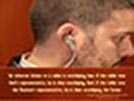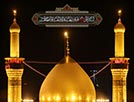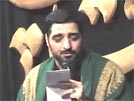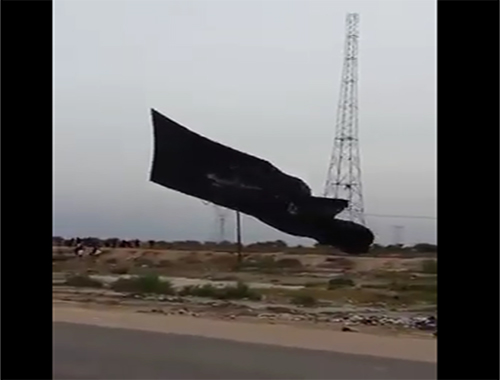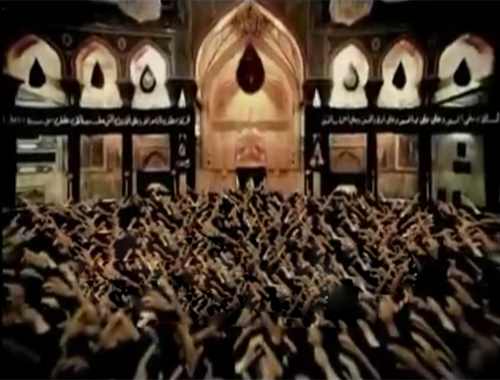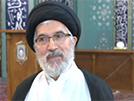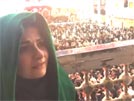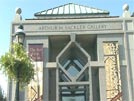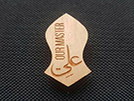Verses 11-15
- Details
- Hits: 2438
Sura Shams
(The Sun)
No.91 (Verses 11-15)
(11)كَذَّبَتْ ثَمُودُ بِطَغْوَاهَا
(12)إِذِ انبَعَثَ أَشْقَاهَا
(13)فَقَالَ لَهُمْ رَسُولُ اللَّهِ نَاقَةَ اللَّهِ وَسُقْيَاهَا
(14)فَكَذَّبُوهُ فَعَقَرُوهَا فَدَمْدَمَ عَلَيْهِمْ رَبُّهُم بِذَنبِهِمْ فَسَوَّاهَا
(15)وَلَا يَخَافُ عُقْبَاهَا
11. The Thamood (people) rejected (their prophet) through their inordinate wrong doing,
12. When rose up the most reprobate of them,
13. Then the Messenger of Allah (Saih) said to them: 'It is a she-camel of Allah and (bar her not from) having her drink
14. But they rejected him and hamstrung her, so their Lord crushed them for their sin and levelled them (with the ground),
15. And for Him is no fear of its consequences.
Commentary:
The Fatal End of the Wrongdoers!
Following the previous awakening verses about the end of those who pollute their soul, in the next verses one of the clear examples of these people, of the past, is referred to and the destiny of the Thamood is explained with some short, expressive, decisive sentences It says:
The Thamood (people) rejected (their prophet) through their inordinate wrong doing,
The terms /taqwa/ and /tuqiyan/ both have the same meaning, which is 'transgression'; and, here, it means 'exceeding all the Divine bounds and disobeying His Law'.
The Thamood people, whose prophet was Salih (a.s.) are the most ancient people to have lived in a zone between Hijaz and Sham (Syria). They lived comfortably and care-free on a fertile, level land in strong, splendid castles. They not only showed ingratitude for the abundant blessings they had, but disobeyed their Lord by acting rebellious to the instruction of the Apostle Salih (a.s.) and mocked His Sign, the she-camel. This conduct brought perdition to the people by means of a sudden, violent blast from heaven which was accompanied by an earthquake.
* * * *
Then, the Qur'an illustrates one of the clear examples of this rebellious group and says:
when rose up the most reprobate of them,
The term /ashqa/ means 'the most wretched' among them, referring to the person who hamstrung the she-camel which was sent to them as a trial and whose murder was a sign of rebellion against their divine prophet (a.s.).
Some commentators and historians have said that the most wicked man among them, who dared to commit that heinous crime, was Qudar-ibn-Salif.
In some traditions it is narrated that the holy Prophet (p.b.u.h.) of Islam said: The most wicked person among the ancient ones was the murderer of the harmless she-camel of Salih (a.s.), and the most wicked person of the latter age is the murderer of Ali-ibn-Abi-Taleb. A wicked one, who will make his beard dyed (red) from the blood of his forehead.(1)
* * * *
In the next verse there is more about the rebellious impieties of the Thamood people. It says:
Then the Messenger of Allah (Salih) said to them: 'It is a she-camel of Allah and (bar her not from) having her drink.
The meaning of 'the Messenger of Allah', here, is Salih (a.s.). the prophet of the Thamood people; and 'a she-camel of Allah' refers to the fact that it was no ordinary she-camel, but it was a miracle from Allah sent to those people to prove that the prophet was a true prophet and from Allah. One of the specialities of the camel, according to a known narration, was that she exited from inside the mountain to be a clear miracle for the arrogant disbelievers.
It is well understood from other verses of the Qur'an that Salih (a.s.) told the people that they should divide the water of tho town between the camel and themselves so that on one day they could drink the water and, in turn. the next day the camel could drink, without them bothering each other: And tell them that the water is to be divided between them: Each one's right to drink being brou ght forward (by suitable turns) (Sura Qamar,No. 54,verse 28).
And he particularly told them: Touch her not with harm, lest the Penalty of a Great Day seize you, (Sura Shuara', No. 26, verse 156).
* * * *
But they rejected and hamstrung her, so their Lord crushed them for their sin and levelled them (with the ground).
The term /'aqaruha/ is based on /'uqr/ which basically means 'origin, basis' and then 'to cut the basis, or to kill'.
Some have said that the objective meaning here is 'to hamstring an animal', that is, to cut the legs of the animal and make it fall so that it, consequently, dies.
It is interesting to note that the man who was deputed to do the impious deed of hamstringing the she-camel was only an individual whom the Qur'an considers 'the most reprobate' but had, of course, the sympathy and cooperation of the whole people, as the verse, too, mentions the subjective pronoun of the verb in the plural form /'aqaruha/ 'they hamstrung her' which means that others of the Thamood tribe had a share in committing the act, also.
An action like that is usually plotted by a group and, then, is fulfilled by one or a few definite individuals. Furthermore, they are content to do it and pleased with it, which unequivocally introduces the group as participants.
That is why Hazrat Ali (p.b.u.h.) has said: ...for only one individual killed the camel of Thamood, but Allah punished all of them, because all of them joined him by their acquiescing in their contentment to it.' Thus, Allah, the glorified has said: Then they hamstrung her, and turned (themselves) regretful, (Sura Shura',No. 26, verse 157).(2) But, it was too late for that regretfulness.
It was the fruit of their own rejection and impiety that destroyed them and, then, they were buried in their houses by the punishment of Allah.
The term /damdama/ is based on the term /damdamat/ which is sometimes used in the sense of 'to destroy' and sometimes 'to make shared punishment fall upon people' or 'to cut the roots of them', or 'to pound, crush' and sometimes 'to disfavor' or 'to surround, involve', all of which can be applicable, in this verse, because that penalty originated from the wrath of Allah due to their sin which resulted in their being made level with the ground.
The term /sawwaha/ is based on /taswiyah/ which means 'to make level or equal', and it may mean that their houses were levelled with the ground, or Allah sent an equal destruction upon them all, so that no one could escape.
All these meanings can also be accepted.
The pronoun /ha/ in the term /sawwaha/ refers to the tribe of Thamood or to their cities and buildings which Allah destroyed and levelled with the ground.
Some have said that the pronoun refers to the term /damdama/ 'destruction' which is understood from the next sentence,i.e. Allah divided this wrath and destruction equally between them all.
However, the first commentary, seems more appropriat. By the way, this verse denotes that their penalty was the fruit of their sin and was in proportion to it and this adopts to Divine Justice and Wisdom.
It is said about many nations that when they felt that they wee receiving punishment and saw its preliminary signs they becams regretful and repented; but, as some narrations denote, the situation about the Thamood is different. They decided to find Salih (a.s.) their sincere prophet, and kill him when they saw the first signs of the Divine penalty for their disobedience. This shows the depth of their rebellion and disobedience, against Allah, and the Messenger of Allah, Salih (a.s.), whom He saved by His Mercy and then destroyed all the rejectors. 2 Nahj-ul-Balaqa,Sermon 201 (Arabic Version).
Finally, in the last verse of the Sura, in order to clearly warn all those who go on the same path, it says:
And for Him is no fear of its consequence.
There are many rulers who have the authority and power to punish others, but, they fear the consequence that it may have and the reactions of the people. For this very reason they do not use their power completely, or, putting it more directly, their power is based on weakness and inability, and their knowledge is mingled with ignorance, hence, they fear of being unable to afford the unknown results that they will face with.
Allah, the Almighty, the All-knowing, has created and can create at will, and there can be no question of any such apprehension, in His case, that is why He does decisively what He pleases.
Transgressors and wrongdoers should be careful of their conditions, lest they will be involved in the wrath of Allah for their evil actions.
The term /uqba/ means 'end, finite', and the pronoun /ha/, at the end of the Arabic word, refers to /damdamah/ 'destruction'.
* * * *
Explanation:
The brief story of the Thamood:
As it was mentioned before, the Thamood flourished in a territory between Medina and Sham (Syria). The plain was known as 'Wadi-ul-Qura' which forms the southern boundary of Syria. They worshipped a part of a mountain when Salih (a.s.) was sent to them as an Apostle of Allah. He preached to those people and tried his best to correct their faith and conduct, but it was to no avail at all. At last the people challenged Salih (a.s.) saying that they would believe in Allah and obey His Apostle, Salih, if Salih could cause a she-camel to come out of the mountain with a young one. Salih (a.s.) did cause the miracle and yet the people did not believe and correct themselves. It was then fixed that on one day the she-camel would drink of the water of the town and on the next day the people would have the water.
As some narrations denote, even on the day the she-camel drank the water, she gave so much milk that the whole town was supplied.
Salih (a.s.) had already warned them that if they caused the least harm or hurt to her a chastisement from Allah would overtake them. But, the cup of their iniquities was full enough to plan to kill Salih (a.s.) and the she-camel, both, who were obstacles to their carnal desires. They cruelly hamstrung the poor, harmless she-camel by the hand of the most wretched man among them, Qudar-ibn-Salif. But, they failed to find Salih (a.s.) to slay. Alter that he had warned them that they had only three days time in which to enjoy themselves in this world: But they did hamstring her. So he said: 'Enjoy yourselves in your homes for three days. (Behold) there is a promise not to be belied!"(Sura Hud, No. 11, verse 67).
Just three days time for further thought and repentance ! However, they were not only heedless, but also increased their impiety. then, by night came a terible earthquake as a divine punishment, and buried them in their own fortress homes which they thought to be such places of security: The (mighty) Blast overtook the wrongdoers, and they lay prostrate in their homes before the morning. (Sura Hud, No. 11, verse 67).
They were destroyed and the light of life in their land was extinguished so that no one there remained alive, but, Allah saved Salih (a.s.) and his believing followers: when Our Decree issued, We saved Salih and those who believed with him, by (special) Grace from Ourselves... (Sura Hud, No. 11, verse 66).
* * * *
Supplication:
O Lord! You are our hope in avoiding carnal desires; please help us.
O Lord! You inspired in us the understanding of what is 'piety' and what is 'impiety'. Bestow upon us the success of taking benefit from this inspiration.
O Lord! The temptations and intrigues of Satan are mysteriously concealed in the soul of Man. Open their mysteries to us so that we may know them and be able to avoid them.
(1) Majma'-al-Bayan, vol. 10. p. 499. and also in Tafsir-e-Qartabi, vol. 6. p. 7168.
(2) Nahj-ul-Balaqa, Sermon 201(Arabic Version).
The End of Sura Shams
(The Sun)

